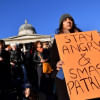#MeToo exists because of unequal power between men and women

Question: How do you know that a social campaign is working?
Answer: When someone organises another campaign opposing it.
French newspaper Le Monde on Tuesday reported that it was sent a note signed by 100 women, including actress Catherine Deneuve, saying that the #MeToo trend shows "a hatred of men", and that it is creating a puritanical wave of witch-hunts of men, and that "touching one knee, stealing a kiss and talking about intimate things at a business dinner" are not offences that should lead to firings.
"Insistent or clumsy flirting is not a crime, nor is gallantry a chauvinist aggression," it adds.
Some years ago, a friend of mine took a part-time job at a large insurance company. A man there decided to do things, such as those described in the letter, to her. He was wooing her quite ardently.
What I've left out of the paragraph above is that he was middle-aged, powerful and married. She was a teenager, still going to school.
She was not amused or flattered. Nor did she feel caught in a delightful dance of seduction, clumsy and uninvited though it might have been.
She was terrified and called her father to escort her home from the office after she had packed up her desk and quit, following one particular stomach-churning episode of sexual innuendo.
This is why #MeToo exists: Because one side has power—in insurance companies, government office, in police forces, in Hollywood—and the other does not.
The power imbalance makes a mockery of the idea that sexual harassment is simply seduction read wrongly by the other party, or that if we demonise harassers, men will forever be too afraid to pursue women, leading to the death of romance.
Harassment and flirtation are not on the same spectrum, where one is the stronger version of the other, and that the difference between the two lies in the eye of the beholder.
"Potato, Po-tah-to" does not apply here because one side, the man's, has credibility, status and the ability to punish women who fail to obey. The voice of the other side was not just much softer, but it was also heard with a degree of victim-blaming, of asking if she deserved it because of her industry ("It's show business, what did she expect?"), what she was wearing, what her behaviour was like at the time of the incident.
Power is what disgraced and fired mogul Harvey Weinstein had. He was not flirting clumsily. He had held the careers of actresses hostage: They give him what he wanted or he would retaliate. Actress Mira Sorvino, in a letter to Time magazine, tells of how Weinstein blacklisted her in Hollywood for years. Refusing him had cost her dearly.
This is why saying that #MeToo criminalises stealing a kiss or putting hand on a knee is ridiculous—it removes those acts from context. If someone steals a kiss from a woman, it matters if he is a stranger or a husband. It matters if he is a producer or director and she a young actress desperate to start a career.
In the age of Tinder and OkCupid, flirting and seduction have not died. Quite the opposite. Flirting has gained superpowers. I know people who flirt on several open channels, simultaneously, while at work.
Okay, emoji and swipes are not quite scented letters and poetry penned in desire, but these seem to make both parties quite happy.
On an app, men and women are equal, there are no repercussions for ghosting, no one side feels obligated to say yes because there is a penalty for saying no.
See the difference?
John Lui is senior correspondent with The Straits Times.
Copyright: The Straits Times/Asia News Network










Comments